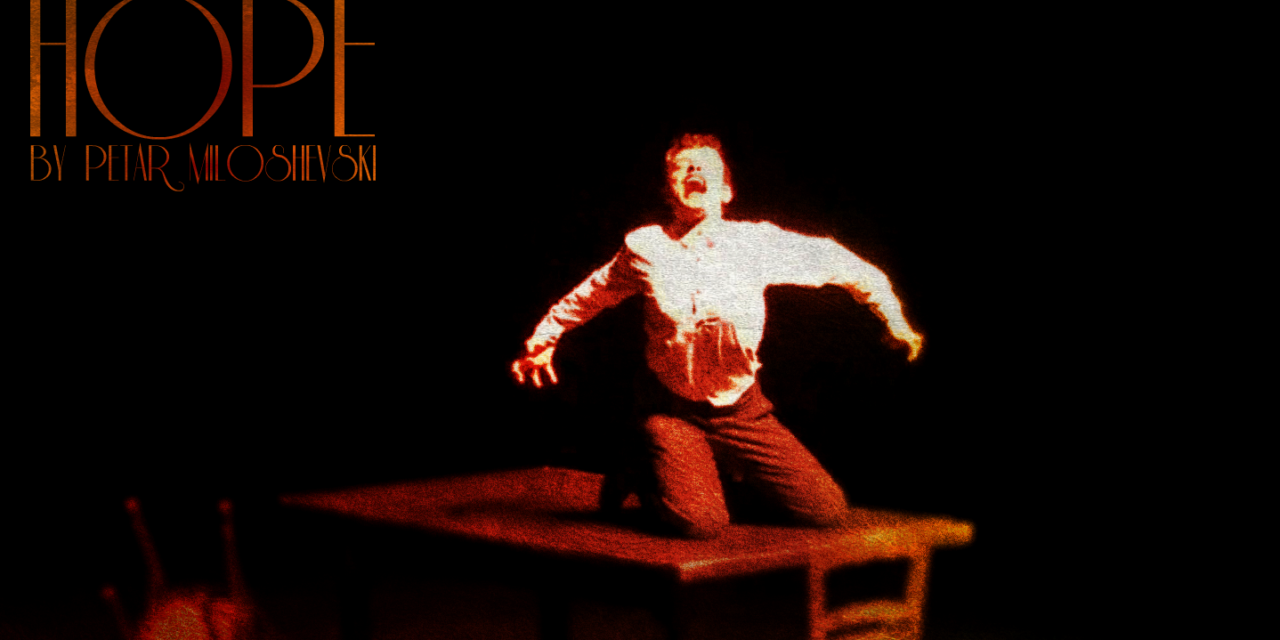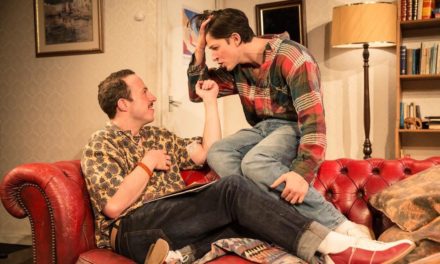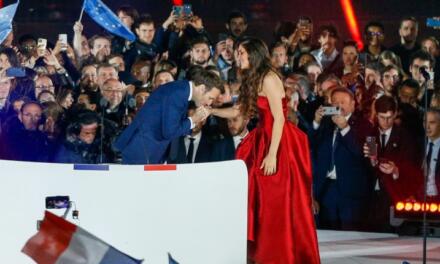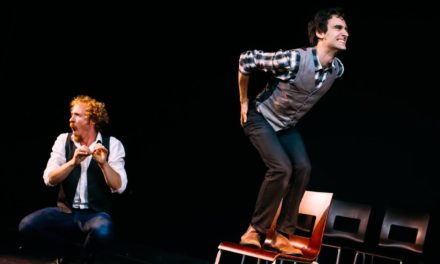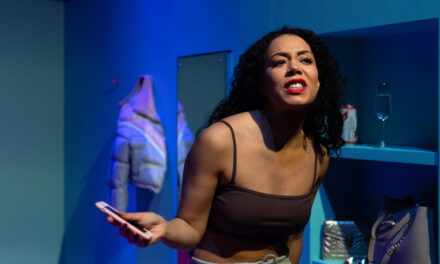An interview with Petar Miloshevski – A London-based actor, performer, theatre artist.
Petar Miloshevski was born in Bitola, Macedonia, educated in Sofia and London, and is professionally based in London. He trained in Drama Acting at the National Academy of Theatre and Film Art in Sofia, and has an MA in Advanced Theatre Practice (Performance) from the Royal Central School of Speech and Drama, London. He has received several awards for best actor-performer and best original show for his impeccable solo-performances: HOPE, The Beautiful and LOVE, which were performed at fringe theatre festivals in the UK and Europe. We speak as he has just finished performances of his solo-pieces LOVE and The Passion According to BIBI at Theater im Delfi in Berlin.
Ivanka Apostolova Baskar: Petar, let’s start with the beginning. Why did you decide to study in Sofia, and then proceed to London, at two excellent schools with worldwide reputations for drama and performance? Compared to the theatrical climate in Macedonia then and today, what was it that you needed from an education, methodology, technique, and art that you couldn’t get from our local theatre system? From your perspective, could you make flash comparisons between the London stages and the theatre in Macedonia, then and now?
Petar Miloshevski: Every time I think of my very beginnings, I am reminded of how lucky I was to be born in Bitola at that exact time. The Bitola National Theatre in the early ’90s was an extraordinary cauldron of ideas being expressed through a bewildering range of genres and forms. As a child, I was so fascinated by the vast array of work coming through the theatre that it wouldn’t be unusual for me to go and watch the same show 15 times. Today, on London’s stages, I get to see some performance styles that are viewed as “innovative”, but I have seen them 20 years ago in my hometown.
I got into theatre almost by accident, when my primary school teacher sent me to an audition at the age of 8. I won, and this led to my very first show. As a child actor, I subsequently appeared in three professional shows at Bitola National Theatre and worked with some of the most popular directorial names of that time. At the same time our amateur theatre company, which was working as part of the Centre of Culture in Bitola, was tackling some of the most important theatrical texts in the boldest ways, ranging from Shakespeare through to Chekhov and contemporary writers.
In retrospect, when I recall that period, I think we were absolutely insane. There were fascinating dynamics among a group of fascinating individuals, and that’s probably why at least 80% of that group are now professional actors and directors. I mean, I played a transgender person at the age of 16 – an overtly sexualized character, something which is now, two decades later, regarded as an eminently contemporary topic. There we were, insane kids, going after the impossible, every single time getting better and better. The audience never stopped being fascinated by our work, and their numbers never ceased to grow with each project. We then all went our own ways to study professionally, but these were undoubtedly fascinating times.
I never had any ambitions to be anywhere other than where I was, so when I applied to the Faculty of Drama Arts in Skopje, that was as far I was able to see at that time. I was turned down in the very first round, second to last. Basically, I was regarded as totally incompetent. It was the first major shock in my life. I was 18 and couldn’t believe that my dreams were all for nothing. I demanded answers. From the assistants of the professor who was auditioning that year in Skopje, the feedback was that I am too ready, too prepared and too good. Apparently, I was rejected because I was too talented!
At that time, Sofia was the only option. I believe I was first on the list of the accepted international students that year at the National Academy of Theatre and Film Art. Obviously, it turned out to be the better option by far; Sofia’s Academy was one of the best in terms of their actor training methodology. On a personal level, those four years were a torturous and difficult search for the kind of artist I wanted to be. I rapidly flourished after I graduated, and was immediately given the opportunity to be professionally employed at the Blagoevgrad Drama Theatre for two years. This quickly allowed me to find and develop my most sacred talents, and from then on it was like flying. Although I was enormously grateful to have been trusted with this opportunity, I soon got to a point where I felt that I was reaching a ceiling in terms of how far I could develop within a repertoire theatre house. That is when I began to search for new horizons. The new horizon turned out to be London, where soon after moving there I was accepted onto the Performance strand of the Masters in the Advanced Theatre Practice at the Royal Central School of Speech and Drama.
And to answer the last part of your question – my knowledge of the contemporary Macedonian theatre and performance scene is quite limited, but from what I’ve seen in recent years, it’s more than obvious that there’s an honest and genuine drive to make interesting and radical work. I admire the talent of many theatre and performance makers there, but I think that it would do a lot of good to the Macedonian scene if there was more support for the independent scene to develop even further.
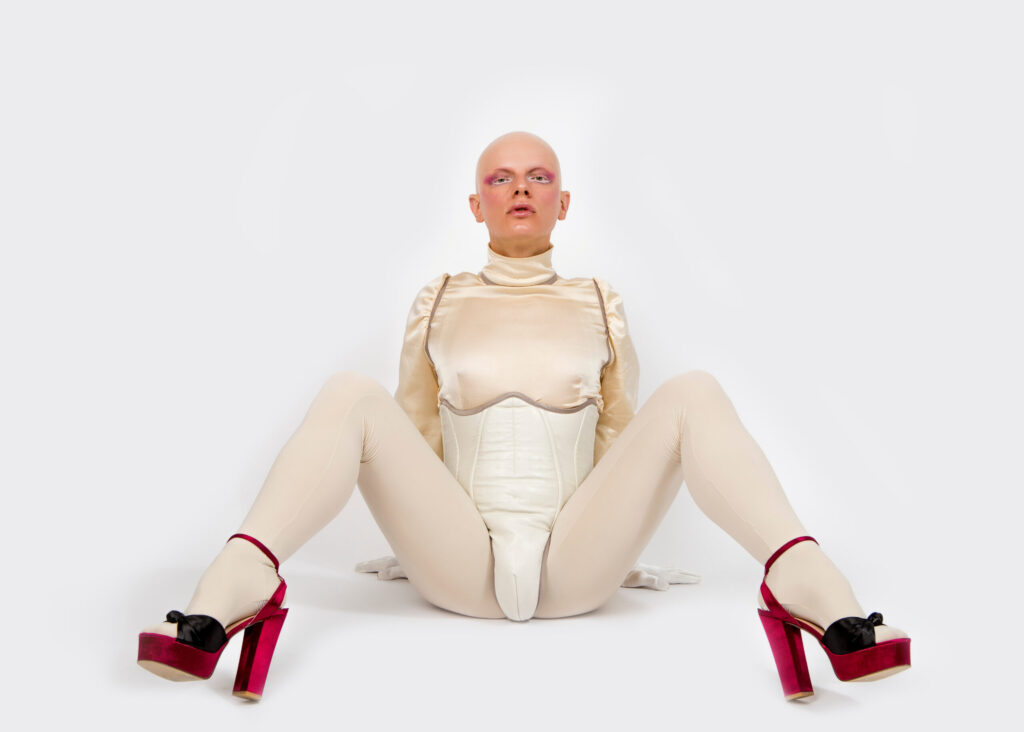
Photo courtesy by Petar Milosevski
IAB: In your post-dramatic, solo-performances you are precise, elegant, dedicated, focused, thorough, inspired and inspiring. You are richly charismatic. Your body and your stage persona reflect 100% professionalism, and you have many stylish and technical influences. On stage you are brilliant, multilayered and physically eloquent; I enjoy your English and your remarkable diction. Why do you focus on solo performances – what modes of expression does this format allow?
PM: I believe It was the third year at the Academy in Sofia when, in the first semester, we were given the task of working on monologues. I ended up being one of only two students who managed to get through the whole process and showed the result for our final exam. I constructed my monologue from bits and pieces of Harold Pinter’s A Slight Ache. After showing it for the first time during class, one of my dearest professors said – “Colleagues, I finally see a real actor on the stage up there”. Back then, I simply didn’t know if I would be able to sustain audiences’ attention for a long time, and it never crossed my mind that one day that would become the primary channel through which I’d be able to express myself professionally. On many occasions, I was turned down for a role with the explanation that I am too strong compared to the other actors, which was obviously a difficult and dispiriting thing to hear as an actor. I simply had to find a way of turning this perceived trait into an asset.
I started experimenting with solo shows during my MA studies in London. First, they were site-specific, short pieces performed in various places around the city – ranging from art galleries and pubs to public toilets! I was slowly finding a balance, and I started incorporating my deeply-held beliefs and understandings of theatre. I combined the text with strong costumes, intense physicality, and striking soundtracks and lighting designs. I strongly disciplined my body, my flexibility, my speech, and delivery. I expanded my horizons by watching and listening to as much as possible. I was trying to be actually, strongly political, and voice my beliefs, concerns, and opinions, through an aesthetic that was not easy to label, and difficult to compare to anything and anyone else. Without realizing, I found myself creating a form of expression many people (including myself sometimes!) find challenging to define. Is it theatre? Performance art? Dance? Spoken word?
I came to understand that in some parts of Europe, the notion of a “one-man-show” is usually regarded as the utmost achievement of an actor at the height of their maturity. In the UK however, that is the opposite. An astounding number of young theater-makers are using the solo show as a medium of self-expression, and it is hugely popular. The kind of solo show I develop is a total realization of my ideas and beliefs of what theatre and art should be all about. I’m personally invested in all elements of the craft, and I set up personal challenges with every new work. I am curious to find out what my limitations are if there are any, and how to go even further in terms of text, visual and bodily expression.
Having said that, it must be said that I am not exclusively a solo-performer, even though I somehow established myself as one in recent years. It came out of what my situation was, and I tried to make it into an advantage. There are aspects of group work that I miss; the creation of solo work can be a lonely process. But on the other hand, I have chosen some incredible collaborators with whom we always aspire to the same great artistic achievements.
IAB: You’re a complete author – you create the concept and text, you direct, and design lighting and music (excluding Antonella Petraccaro’s costumes). You combine the energies of top “enfants terrible” from world literature, classical music, fine art, theatre, film – their minds are super-vital to your creativity. You stage current topics, like consequences of the selfish body, robotization of love and sex, cannibalization and sexual nirvana, and the beautiful transformations that result from frustration or self-doubt. Please share more about your interpretations of themes and dilemmas.
PM: My solo work essentially functions as an eclectic collage of many elements. It all begins when I form an idea I want to explore and work on, and I then gather texts from a huge range of materials – from novels and plays, through to newspaper articles and ads. They all get transformed and re-edited through a lengthy process of changing grammatical tenses and genders until they lose their previous integrity and achieve a brand new existence as part of my own, new script. I am often inspired by a particular music piece – I hear a piece and I know that one day I will use it. It is just a matter of waiting for the right opportunity to include it in my work. For instance, a music track I had been admiring for a long time found its place twelve years later, when I was composing my solo piece The Passion According to BIBI.
All these elements bind into a peculiar (peculiar sometimes even to me!) scaffolding, together with the crucial physical score, the costume, and the lighting compositions, until they become the final poetic, “sublimated” expression that I seek for the particular story I want to tell.
I’m always incredibly interested in developing stories based on an individual who is teetering on the verge of existence, and yet aspires to a higher state of consciousness. This is an aspiration that highly motivates me. In all of my shows, I tackle dilemmas and notions – sexual, political, societal – that I regard as crucial to the times we live in. The essence of HOPE was the utmost degradation of a person left by the love of his life, THE BEAUTIFUL had pedophilia and parent-child abuse at its core, LOVE was about the total and literal consumption of the self for reaching absolute ecstasy. My most recent show, The Passion According to BIBI, speaks of the robotization of our feelings and bodies. At the same time, it is also my most personal and even autobiographical one, created just after one of the most dramatic periods in my private life. I put the individual microcosm at the very core of my shows, which I think of as fairytales for grownups, and see how that microcosm has an absolute implication for the macrocosm – our mutual and total existence as a whole.
IAB: Do you agree with the category of LGBT theatre/LGBT performance? Does this term/category restrict you, or do you find it appropriate for your interests, artistic approach, expressive directions, and creative messages?
PM: One could say that the LGBT ”box” is always ticked in relation to any of my work, but at the same time it is very debatable!
With each show I worked on, I discovered more and more about my own perceptions and what I was trying to achieve. As time went by, both my ideas and my representations of my ideas became clearer. This actually got me into a certain amount of trouble: some of my earliest supporters, who professed to be fascinated by my early works, began to feel a little uncomfortable with what I was producing. They weren’t explicitly saying that the work was too gay, but they were cryptically saying things, like my work, “had lost its magic”, or that I should tone it down. They were carefully and politely tiptoeing around the issue, but it soon became clear that whatever was bothering them actually stemmed from homophobia. At that particular time, many of the festivals that used to invite me regularly, suddenly went quiet. This was in complete contrast with the message coming from their audiences, who were coming to see my shows in ever-growing numbers, and with ever-growing appreciation for the way in which I handled my topics. Somehow, instead of looking at the reality of their audiences’ reactions, they were allowing themselves to be blinkered by their own personal insecurities and prejudices.
On the other hand, I tend to profoundly differ from what an “LGBT performance” is, depending on the geographical, societal and political context in which it is taking place. For instance, in countries where there is explicit persecution and intolerance of LGBT culture, one might think that these shows will be totally underground and politically radical. In countries with less severe restrictions, these shows might still be very bold and daring, but will perhaps also be willing to take more aesthetic risks. In so-called liberal societies like the one I live in, LGBT shows are more often in the form of pure entertainment, perhaps with a slight political stance. In the context of the hard-nosed economics of a neoliberal capitalist system where salability is often the sole measure of success, they are ultimately conceived as largely marketable and sellable pieces. The restrictions on freedom of expression come from a different source!
Recently, by pure accident, I bumped into a woman, probably in her early sixties, who recognized me and spoke with a great appreciation about one of my shows she had seen a few years ago in London. She remembered it as if it was yesterday, and said how such work is very needed and important, and I must go on. I will also never forget when, after performing LOVE at a wonderful international theatre festival in Targoviste, Romania, this very young guy, no older than 19 or 20, came up to me shyly and quietly said to me, “thank you for your show, I’m gay and this was a very important thing for me to see.”
Judging from many of the reactions I have had to my work, from people in a wide range of socio-political environments, it seems that what I produce reaches audiences in a more intimate and universal way, beyond the boundaries of particular societal structures. If this is true, then that fills me with great joy because this is what I always seek to achieve. But it is also a challenge, as my work never seems to really fit the LGBT performance criteria, which are so context-dependent. I often find myself at odds with LGBT cultural events, a paradox that is sometimes difficult to experience, as LGBT politics are so close to my heart. Perhaps it is a paradox I will resolve one day.
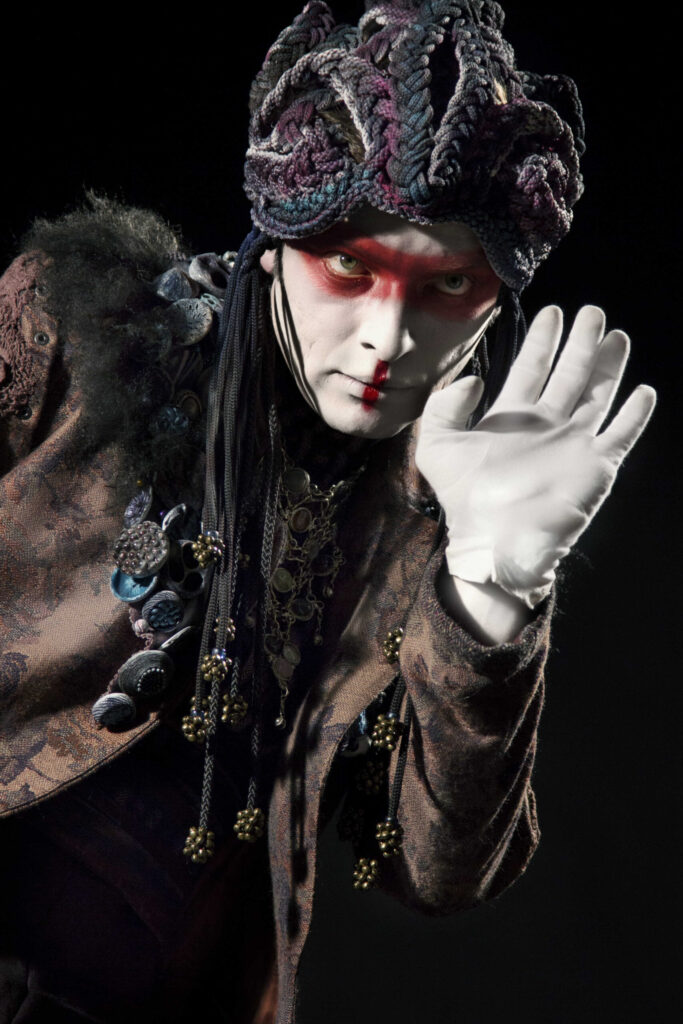
Photo courtesy by Petar Milosevski
IAB: In your opinion, what perspectives does performance take on modern times? We live in an era of rapid saturation, rapid changes in art, retrospectives, and summaries. Yet, it is also a time of new and unprecedented interpretations of classics. We are also in a period of post-deconstruction that’s inverting the postmodern. It is a time of spontaneous and inevitable polarization of differing scenes due to different targets and modes of expression, aesthetics, poetics, and narratives. It is also the time of internationalization of arts and culture, what with the Germans first legally formalizing internationalization of art and culture in the last three years.
PM: I believe there are so many exciting artists out there who have a clear insight into what is happening in our world. They follow and understand current discourses, and try to create exciting work. Unfortunately, many of these artists will forever stay in the margins because in a country like the UK, where market forces influence every aspect of life, being marketable and showing potential for selling out is a must. I am always keen to follow the new names, to see what kind of freshness they bring and what I can learn from them, but I still see the established ones. Some of them are still so incredible, but others not so interesting anymore because they’ve become so popular and sought after that they’ve inevitably fallen into the “establishment trap” along the way.
You refer explicitly to German theatre in your question – a country we automatically associate with the most exciting theatre out there. But even German theatre has its “establishment trap”. What was once so unique has now become a set of formulas. In so many cases, you watch German productions and you discover that they too have become rigidly formulaic and that it is not as exciting as it once was.
One of the things that allows me to remain serene (to an extent!) is that the few people in the UK who continue to create bold and brave theatre, those rare crusaders, really go for it. It is still a scene where you can pursue what you really strive for, in the faint hope that somehow, somebody, will pick it up and allow it to grow by publicizing it so you can reach bigger audiences.
Let’s not forget that this country had a massive political earthquake in the shape of Brexit, which caused severe societal fractions. The last general election, when it became clear that the Remain cause has completely lost, showed we have to work to create the most positive outcome within this new political and societal landscape. On one hand, London, a few of the bigger cities and the whole of Scotland are pro-European, cosmopolitan and open to a new influx of ideas, and on the other, communities are leaning towards isolationism, nationalism, and a nostalgia for the fantasized “good old days”. I observe how in recent months, if not even weeks, it is becoming more and more “fashionable” to be a right-winger. Obscure artists suddenly emerge in the public eye, are very vocal against the “politics of identity and gender”, arguing that it has all gone too far and destroyed “healthy public debate”. But even if we think that nothing should be beyond examination or criticism, that scrutiny is important, the biggest challenge is that the debate has become so polarized. It is sometimes so bitter, that even the slightest questioning is immediately high-jacked and weaponized by the right-wing.
These are crucial times when notions of “otherness” and identity are becoming more and more scrutinized. There is a pressure to define our personal identities – of belonging to a particular nation, ethnicity, sex, or gender – into ever-more fragmented branches. There are structures vigorously resisting this further fragmentation, criticizing it as one of the biggest threats of a sense of community, of an established order – even in its most liberal sense.
I think all this is actually very exciting and uniquely interesting. Our challenge as theatre-makers is to find the poetics, beauty, tragedy, simplicity, complexity and all else possible in the ideas that divide us, and find a way to turn them into exalting unification!
IAB: Petar, how do you perceive audiences in London, other places in the UK, and places like Hannover, Berlin, Paris, Kiev, Yerevan, Skopje, Bitola? How does the audience – geographically, individually and collectively – react to your performances?
PM: In theatre and performance, my experience is that it is more a matter of the moment, rather than any geographical discrepancies. I’ve often found that people in the so-called “provinces” are more receptive to ideas than the established order of the big “metropolis”. Even though it is common practice, particularly when it comes to cultural institutions’ marketing practice, I disagree with the idea that a certain audience group only has certain interests. It’s not all about ticking boxes. The horizons are much wider than that. Cultural institutions usually underestimate their audiences and underestimate their receptiveness. There is prejudice there, too! Luckily, the audience knows this and has the final say. Of course, as artists, we should always aspire to assist vulnerable groups and disenfranchised communities, and this should be our priority. But I know for certain that if you’re speaking the truth if you open up and deliver what you truly believe in as an artist, even if your audiences are in places that are considered to be in relative cultural isolation, they will always accept you.
IAB: Are you planning to develop and perform solo performances in the long run? If you have the opportunity, would you permanently join an ensemble of a repertory theatre? Or do you not have those ambitions?
PM: I am constantly open to all kinds of ideas. I squeeze the lemons that life gives me at any given moment. If I know deep inside me that a certain project is right for me, and I’m curious enough to work on it, it really doesn’t matter who it’s with or where. Because I will know already that it is the right thing to do.
IAB: What does it mean for you to create in London? You are exposed to monumental competition, what are your challenges in that location and at this stage of your career?
PM: London is my place. It is my home. I am a total Londoner in so many ways. If there is one geographical term that I must identify with, then that’s the one, for better or for worse. London is huge and daunting, yet incredibly exciting. I am lucky that I’ve survived as a person and as an artist all these years, and I’m grateful that I still have the appetite to go further. But I must be candid – the challenges are there, will always be there, and it is always excruciatingly difficult.
IAB: In 2019, your shows LOVE and The Passion According to BIBI was invited to enter Theater im Delfi’s repertoire in Berlin. What has this opportunity changed for you, and what has it enabled you to do?
PM: I was over the moon to have the chance to perform both of my shows, LOVE and The Passion According to BIBI. Berlin had always been on my radar and presenting my work in that city represented such an achievement for me. I had fantastic responses from my audiences. Many of them would stay after the performances and engage in conversation with me. I was incredibly delighted that many Berliners I knew finally had the chance to see my work.
This experience enabled me to understand that the independent and state theatre scenes in Berlin are quite divided and that it is a real challenge to bridge the gap between these two entities.
I learned that not all of Berlin’s theater is as harmonious as I thought. I was particularly shocked when I was strongly advised by the theatre’s director that we shouldn’t have the official poster of The Passion According to BIBI displayed on the main theatre entrance because he feared that neo-Nazi groups in the area might break their windows.
I now understand that things are not always as they seem, and that made me want to strive for even more.
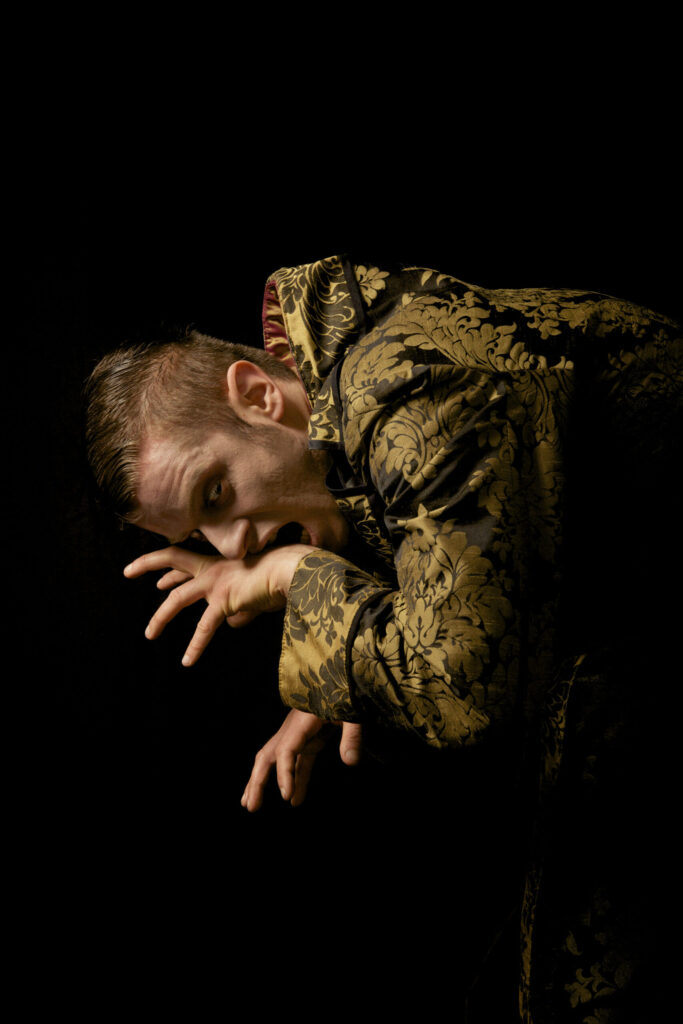
Photo courtesy by Petar Milosevski
IAB: What are your current project preparations and research? What is the concept for your next project?
PM: I am very secretive when talking about my new ideas and projects. There is an idea that has been rolling around in my head for quite a while, and I’m waiting for the right moment to get it realized. I also want to experiment with different media, and that excites me. I will definitely give you a shout when the new one is born!
IAB: Thank you very much, dear Petar, it was my honest pleasure interviewing you.
PM: I’m very delighted and much obliged.
Skopje/London, 2020
This post was written by the author in their personal capacity.The opinions expressed in this article are the author’s own and do not reflect the view of The Theatre Times, their staff or collaborators.
This post was written by Ivanka Apostolova Baskar.
The views expressed here belong to the author and do not necessarily reflect our views and opinions.

